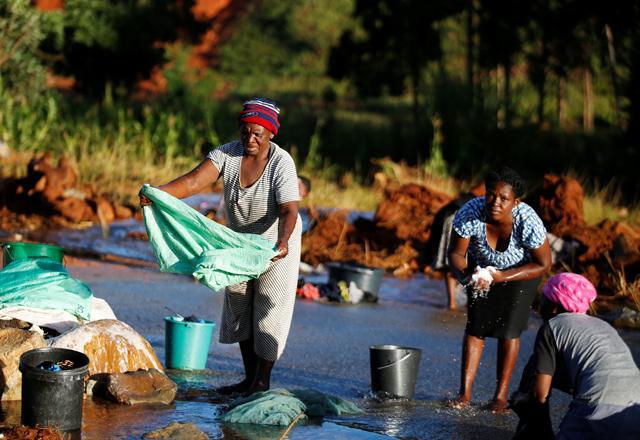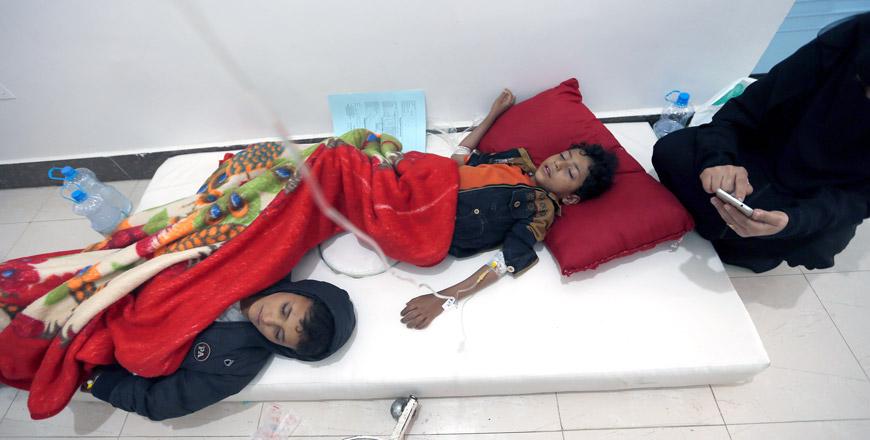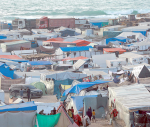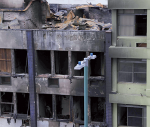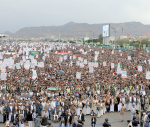You are here
Destructive Cyclone Idai was a climate change 'alarm bell' — UN chief
By Reuters - Mar 27,2019 - Last updated at Mar 27,2019
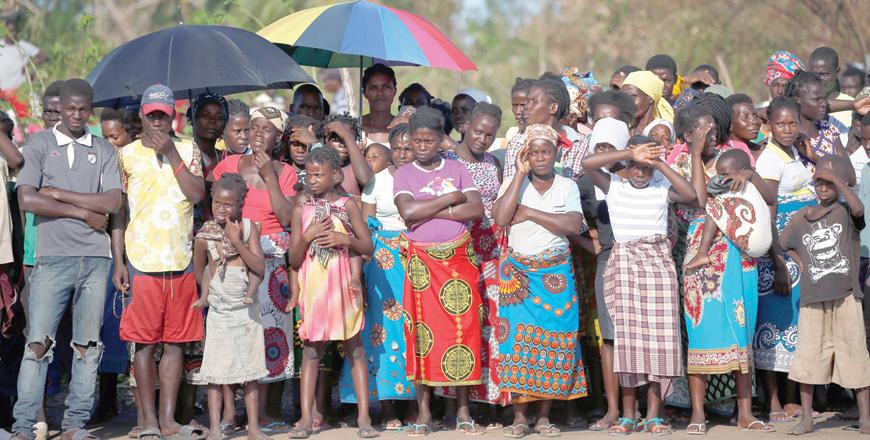
People look on as they wait for food aid in the aftermath of Cyclone Idai in Guara Guara village, near Beira, Mozambique, on Tuesday (Reuters photo)
BEIRA, Mozambique — Cyclone Idai's deadly hit has left some 1.85 million people in need of assistance in Mozambique in a catastrophe that United Nations chief Antonio Guterres on Tuesday called "yet another alarm bell about the dangers of climate change".
Guterres described Idai, which flattened homes and caused massive flooding after slamming into Mozambique near the port of Beira on March 14, as "an uncommonly fierce and prolonged storm".
The cyclone ripped through neighbouring Zimbabwe and Malawi, killing at least 686 people across the three southern African countries. In hardest-hit Mozambique, tens of thousands of homes were destroyed and hundreds of thousands of people were displaced across an area of some 3,000 square kilometre — roughly the size of Luxembourg.
"At least 1 million children need urgent assistance and this number may well grow. We fear that whole villages have been washed away in places we have yet to reach," Secretary General Guterres told reporters at the United Nations.
There were reports that $1 billion worth of infrastructure had been destroyed, he added.
While scientists say single weather events cannot be attributed to climate change, they say global warming is causing more extreme rainfall and storms, sweltering heatwaves, shrinking harvests and worsening water shortages around the world.
Receding flood waters in Mozambique have allowed greater access, and a greater sense of how much people have lost. Thousands of people, stranded for more than a week by the flooding, are now being moved to safer shelters.
"We're now going out on the ground, dropping people off from helicopters to determine what the critical needs are," said Sebastian Rhodes Stampa, coordinator in the UN Office for the Coordination of Humanitarian Affairs.
Big, dense population
Increasingly, the relief focus has turned to preventing or containing what many believe will be inevitable outbreaks of malaria and cholera.
Although no cholera cases have yet been confirmed, health workers on the ground have reported an upsurge in cases of diarrhoea — a symptom of the disease.
"We are testing as we go," said Rob Holden, the World Health Organisation's (WHO) incident manager in the capital Maputo. "But nonetheless we are treating acute watery diarrhoea, it's the same as treating cholera. That's just the diagnosis."
Dozens of people queued in front of a clinic in Beira's Munhava district on Tuesday, as nurses wearing surgical masks handed out a chlorine solution to prevent the spread of diseases.
"There is a big population, dense population in Beira," said Gert Verdonck, emergency coordinator for Medecins Sans Frontieres (MSF). "Of course any spread of any kind of epidemic will be a lot quicker here."
The WHO is dispatching 900,000 doses of oral cholera vaccine from a global stockpile. The shipment is expected to arrive within 10 days, and a first round of vaccinations will target 100,000 people.
Cholera is spread by faeces in sewage-contaminated water or food, and outbreaks can develop quickly in a humanitarian crisis where sanitation systems are disrupted. It can kill within hours if left untreated.
The United Nations World Food Programme (WFP) has designated Mozambique a level three emergency, placing it on a par with Syria, Yemen and South Sudan. The agency is preparing to feed 1.7 million people in Mozambique, which has a population of around 30 million.
The UN is appealing for $282 million to fund the first three months of the disaster response in Mozambique, and a total of $337 million. So far, only 2 per cent of that amount has been funded.
Searching through rubble
In Zimbabwe, where 179 people have died, another 329 people were still unaccounted for on Monday.
In Chimanimani district, villagers used hoes and shovels to dig through debris on Tuesday and search for missing relatives believed buried by the mudslides unleashed by the cyclone.
One family has spent a week digging day and night for four relatives, in what was once a settlement of 500 people but has been reduced to rubble.
Large rocks, some more than two metres high, which rolled from a nearby mountain at high speed are what remains after the storm swept away a police camp, houses and an open market.
"I am an orphan now and I am so much in pain because I lost my brother who looked after me. He was more of a father to me," said Sarah Sithole, 32, whose policeman brother was washed away while on night duty at the police station.
"We will continue searching until we find him and bury him. We will not rest," she said, her hands and feet covered with red soil.
Around 95 per cent of roads in affected districts have been damaged, impeding access to rescuers with earth moving equipment. Zimbabwe has asked South Africa to send search dogs to help look for those missing, a local government official said.
The WFP said it will aim to distribute food assistance to 732,000 people in Malawi and 270,000 in Zimbabwe.
Related Articles
BEIRA, Mozambique — Disease is threatening to aggravate the already dire conditions facing millions of survivors following the powerful trop
AMMAN — Jordan on Wednesday expressed condolences to Malawi and Mozambique after a tropical storm resulted in several deaths and injuries.&n
SANAA — At least 570 suspected cases of cholera have surfaced in war-torn Yemen in the past three weeks, sparking fears of a potential epide


